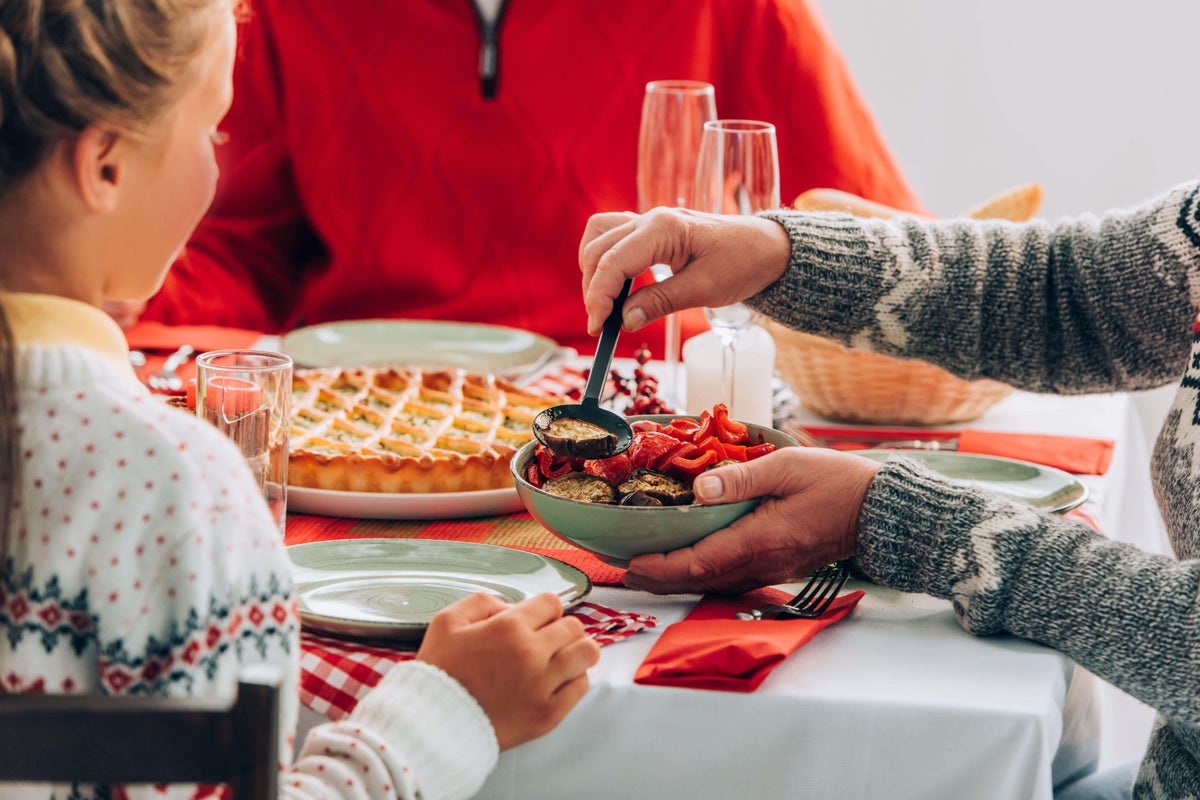
‘Nut roast’ are two words that will strike fear into any vegetarian’s heart.
Many of us are trying to add more veg into our diet – for the planet and our health – but festive food seems to be one area where vegetarian and vegan food hasn’t come very far.
It tends to be a time of excess (and that often means a whole lot of meat), leaving veggie dishes to be a bit lacklustre and dry.
That’s why Heather Thomas has written The Veggie Christmas Cookbook, saying: “There aren’t a lot of books out there dedicated to Christmas for vegetarians, and I think vegetarian people ask: ‘What can we cook, what can we do that’s special? How do we get away from a nut roast, all that traditional brown and beige food people used to eat?'”
Thomas’ recipes are colourful and vibrant – suitable for veggies, vegans and meat-eaters alike. These are her top tips for making the best vegetarian festive food this Christmas.
Be as prepared as possible
Particularly if you’re catering to a lot of different dietary requirements, a bit of planning will go a long way.
“Plan and prep, if you’re organised enough to do that in advance,” advises Thomas, who is in her 50s. “It means it’s much better when the time comes, because you’ve always got something in the freezer if guests turn up unexpectedly.
“You can do party foods in advance, you can even make stuffings or gravy – veggie versions – and just freeze them until you need them.
“Then you can enjoy Christmas – you can have a few drinks and sit down and have some fun, without having to slave over a hot stove all the time.”
Try some new recipes
Thomas urges us to “get away from the traditional way of doing things” – and that could mean trying new recipes with a classic ingredient.
“Sprouts aren’t boring,” she says, particularly recommending them in a festive salad or coleslaw.
“If you’ve got the green of the Brussels sprouts and you’ve got some lovely red cabbage shredded up and you do a citrusy dressing – a fresh one or a mayo one – you’ve got something which is totally different. It’s really fresh and zingy, when perhaps you’re having a lot of heavy food and sweet stuff.”
Stock up on filo pastry
This is Thomas’ secret weapon for vegetarian cooking. “You can make wonderful things for festive food with filo pastry – you can make wonderful Christmas crackers,” she says.
“Instead of putting veggie fillings like butternut squash into pies, if you have some filo pastry in the freezer or the fridge ready to go, you can roll it out, [put in the filling] and roll them up like cigars, and tie the ends with chives. They look like little crackers.”
Think about festive touches
“I think all the festive touches are really important,” enthuses Thomas – and this could be as simple as having pomegranate seeds on hand.
“Anything will get perked up – whether it’s a salad, a coleslaw, desserts – if you sprinkle them with pomegranate seeds. They’re just lovely, they catch the light, they’re like little ruby jewels, and they’re crunchy and sweet.”
Shop seasonally
One of the simplest ways to make sure your vegetarian food is full of flavour is by using seasonal ingredients.
“Use the best quality ingredients you can find that are really fresh and seasonal,” Thomas recommends. “At Christmas, you don’t need to buy lots of imported, exotic things. Often the locally grown, more sustainable, freshest ingredients are the best.
“A bit like the Mediterranean concept of unfussy food, where if you use a few really simple, fabulous ingredients, you can make the best food – and it’s the healthiest.”
For Thomas, that means vegetables like pumpkin, butternut squash, carrots, cabbage and beetroot.
Make dishes that appeal to veggies and meat-eaters
Thomas suggests one of the biggest traps people fall into is trying “to do a vegetarian version of traditional food”, she says, and this can be quite time-consuming and not always the most delicious option.
Instead, Thomas suggests making “adventurous and and colourful food people really want to eat” – even non-vegetarians.
She’s also keen to encourage people to include more vegetarian dishes on their tables, saying: “Meat is quite heavy. So many people stock up with a huge turkey and a great big ham and other joints of things and sausages, but it is heavy and it’s very rich – particularly when you’re eating it with gravies and rich sauces and things.
“If you go vegetarian, it’s a much lighter way to eat, you can get your protein from other sources – like beans, lentils, as well as the dairy foods for non-vegans. And also, it’s cheaper. I think everyone’s going to be much more budget conscious this Christmas – they’re not going to be able to afford to buy the meat or huge salmon they would buy in the past to celebrate. We need to show you can have a feast with this wonderful food – but it is cheaper, and it’s healthy.”
Use up all the leftovers
Thomas says she hates wasted food, so using up leftovers is a big part of the book.
She continues: “If you’re on a budget – Christmas is expensive, you don’t want to be throwing a lot of food away. So, if you recycle leftovers into other things, and create a delicious lunch, dinner or brunch – it’s got to be a good thing.”
Thomas says it’s “very boring”, but her favourite way to use up leftovers is a classic bubble and squeak – otherwise you can add spices and make a curry from leftover veg, or blitz them up into a soup.
‘The Veggie Christmas Cookbook’ by Heather Thomas (published by HarperNonFiction, £12.99; photography by Joff Lee), available now.







